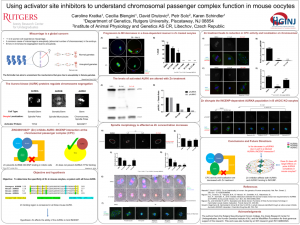Kratka, Caroline: Using Activator Binding Site Inhibitors To Understand Chromosomal Passenger Complex Function In Mouse Oocytes
Title:Using Activator Binding Site Inhibitors To Understand Chromosomal Passenger Complex Function In Mouse Oocytes
Name: Caroline Kratka
Major: Genetics
School affiliation: Douglass Residential College, Honors College, School of Arts and Sciences
Programs: Aresty – Research or Conference Funding Recipient, Honors College Capstone
Other contributors: Cecilia Blengini, Karen Schindler, David Drutovic and Petr Solc
Abstract: Miscarriages affect 10% of women aged 25-29, and 53% of women older than 45. The primary cause of miscarriage is aneuploidy that originated in eggs. The Aurora kinase (AURK) family has three members that regulate chromosome segregation during cell division. Distinguishing the roles of these isoforms is important to understand the etiology of aneuploidy. In meiosis, Aurora kinase A (AURKA) localizes to spindle poles, where it binds TPX2. Aurora kinase C (AURKC) localizes on chromosomes, where it replaces AURKB as the primary AURK in the chromosomal passenger complex (CPC) via INCENP binding. It also prevents chromosomal AURKA localization via competition for binding INCENP. AURKC also localizes to spindle poles but its function there is not well understood. Although AURKA compensates for CPC function in oocytes lacking AURKB/C, it is unknown whether AURKA binds INCENP in wild type mouse oocytes. Yet, it is challenging to study meiotic AURK complexes because ATP-competitive drugs used to inhibit AURK activity often have off-target effects. ZINC08918027 (Zn) is an allosteric inhibitor that prevents the interaction between AURKB and INCENP in mitotic cells. We hypothesized that Zn would specifically block CPC function without abolishing AURK activity in mouse oocytes. Western blotting and immunofluorescence were used to observe the effects of Zn on CPC and AURKA activity and localization. By western blot, we observed that activated AURKA and AURKC levels in Zn-treated oocytes decreased compared to controls. Zn also caused defects in meiotic progression and spindle building. Perturbed localization and decreased activity of the CPC were confirmed by immunofluorescence. Based on these results, we suspect there are populations of INCENP-bound AURKA and of INCENP-independent AURKC in the mouse oocyte. These data together suggest that both INCENP-dependent AURKA and AURKC activities are needed to secure spindle bipolarity and meiotic progression.
